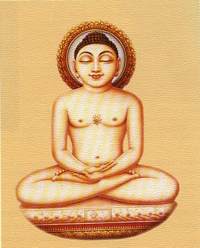
JVB London - Souvenir 2007
on
Ahimsa
Non-violence
Act Not React: From Violence To Cooperation
Most of us know the theory of karma; Action and Reaction. From the perspective of karma philosophy violence plays a significant part. Violence is not only physical but mental and emotional as well. The way we think, speak and respond to any situation creates harmony or discord at personal level and in the community at large. It is also the beginning of the cycle of action and reaction.
The issue then is how to apply it in our daily life to create an attitude that spreads powerful and positive vibrations.
Why React? - We react because of there is disharmony within one's consciousness and preconceptions of other people. One tends to see things as he or she wants them to be. One has not yet realised that the world does not dance to one's tune all the time.
Result - Anger arises when one is not flexible enough to accept that the reality is different from preconceptions, expectations and desires. Failure to control other people and events and letting emotions take control over him also results in anger. Emotions kill the ability of reasoning and rationality so to think one tries to do the impossible, that is, tries to change what he or she cannot change.
Solution - To become quiet and simple within is the first step towards seeing things truly as they are. One should not look for perfection in everything in life and should learn to transform, not suppress, repress or express. One has to adopt an attitude of being non-judgmental and switch the focus from negative to positive.
With conscious effort one could train the subconscious mind to remain in a positive state of being. It does not mean non-observation or non-participation. One should observe and participate with detachment even when there is discrimination or even preference. Reacting can be beneficial provided it is with a positive attitude, without hurting anyone and without expectations.
Action Plan - What is the difference between a discussion, a dialogue and an argument? A discussion is an open exchange of views; a dialogue is a mutual exploration of meaning; and an argumentis a battle of opinions. So in an argument 1 + 1 = nothing; in a discussion 1 + 1 = 2; in a dialogue 1 + 1=3.
It takes courage to have a point of view and yet take an interest in others perspectives and be prepared to shift one's view. This means being flexible and acknowledging that there is more than one way of looking at a situation - which is Anekant.
It is an enlightened soul that moves from an argument to a discussion to a dialogue - a process that is not driven by the need to be right but by a genuine curiosity along with the intention to understand others. One doesn't have to agree or follow or condone but by accepting and beginning an interaction with serenity, invites others to engage in a discussion. And out of this interaction comes the satisfaction of creative expression and an enriching relationship.
 Ashok Gudka
Ashok Gudka